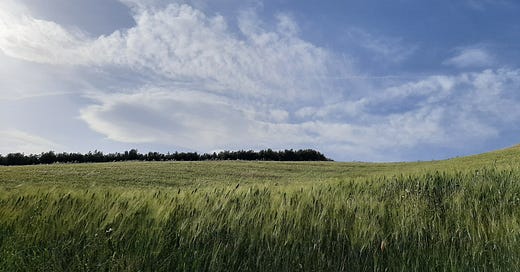sad girl summer
is sadness a question with no answer? feat. Fariha Róisín, Maggie Nelson, H. D. Thoreau
Every year, around the end of May, my well of sadness overflows. It all begins with the peculiar fragrance of summer nights drenched with the thrill of possibility. One twitter user labelled them velvet nights, which I believe succeeds in expressing the texture of an essence that transcends the objective fact of warmer temperatures and the scent of blooming flora —also the saltwater aroma carried in waves by the breeze, if you live close by the sea like myself. For weeks, I am beset with a very specific kind of sorrow, akin to heartbreak, and I am rendered helplessly miserable.
It so happens that I am also washed over with a singular intensity of feeling. For instance, a little while ago, I was overcome with emotion witnessing how much the countryside had changed within mere weeks. Bees and bumbles scurrying across the fields, endless sleeves of ants carrying provisions around the clock and I, a giant creature crouched on my human legs, amiss, taking it all in and marvelling at the miracle that is this very ordinary thing the natural world does. What really got to me, though, was the incessant buzzing, its aliveness. Few things have made me feel as alive as the delight of losing myself into this soft world.
Whenever sadness bubbles up, I return to Maggie Nelson’s extraordinary treatise on the colour blue, Bluets. The lyrical, fragmented prose eschews categorisation: it is both an essay on yearning and feeling lonely, and a memoir of heartbreak.
“Mostly I have felt myself becoming a servant of sadness. I am still looking for the beauty in that.”
Bluets is one of my literary safe spaces and to roam its pages bears the nostalgia of a homecoming. After rereading the book last year, I wrote that Nelson’s writing is pharmakon to my soul and that Bluets leaves me somehow cured of my grief, albeit temporarily. This still holds true, I just finished reading it and I’m astonished at the clarity Nelson conjures in her propositions. The emotional turmoil she experiences is palpable, but she cuts through the flesh of her own feelings with a surgical precision that seems almost ineffable.
This sadness seems to be equally bottomless and immune to banishment. I have poured all my energy in attempting to subdue it, to tame it, also to shift my perspective and look at it with different eyes, but the truth is my affliction has not changed—a statement Mcfadyen’s Darcy would surely endorse1. I hold no answer to my sadness, so I dwell on the question instead. I kneel it and stretch it like dough and despair over its sticky, uncanny corporeality. Why is it that during summer my deepest longings resurface and the yearning makes itself so insistent? Why is it that —and let me borrow my beloved Mary Oliver’s words— “sometimes melancholy leaves me breathless”2?
In a moving poem titled “sadness is a vacuum”3, Fariha Róisín confesses to experiencing a sadness of her own:
Róisín further speculates: “how do you trace it? / a fragmented thing? / a fine line between / totally okay and obliteration?”
In a recent seminar, my Dharma teacher offered an illuminating interpretation of the questions we ask ourselves. He maintained that answerless queries are of the most precious facture because they unfold a wealth of possibilities within whose realm we can find freedom. An answer, he maintained, abruptly forgoes the generative emergence of further opportunities; indeed, it establishes a barrier between ourselves and what could be. Unquestionably an occurrence of synchronicity, during the last Q&A session I attended at the monastery on the first Sunday of June, the Abbott suggested that asking questions allows a silent tension to spark up. The gentle embracing of the resulting friction could indeed engender an unexpected abundance of unique possibilities and likely provide the chance to expand our ability to see beyond the familiar confines of our immediate circumstances.
In his Journals, Henry David Thoreau notes:
An experiment: to reframe my own inner discourse around feeling. I want to try to resist the urge for answers. What if I surrendered to my sadness, what if I gave myself to it?
In a poem shared on Instagram, Gabi Abrão motions towards an understanding of sadness as a mode of inquiry. She suggests that “sadness is not an alarm, it is simply a question without any words filled in yet”. Perhaps this overwhelming sense of sadness could be life’s invite to venture out into the unease and discomfort it often generates, to enhance a practice of balancing attention and release, or to shed a light on the very large, impossible questions we keep dammed up inside ourselves. Inspired by Ali Smith’s sentiments in her latest book Companion Piece, I will attempt a resolution to this investigation. Sadness is never an answer; sadness is always a question. My findings seem to be in accord with Róisín’s. Joining this imaginary conversation, she concludes her poem with both a question and an answer:
“why am i so sad?
the forever question,
an inquiry into the soul”.
Perhaps my sadness is a promising unknown I am yet to embrace.
In the 2005 Pride and Prejudice film, Darcy declares that “my affections and wishes have not changed”, and I find the similarity between the words affection and affliction quite amusing.
An excerpt from “Sometimes”, collected in Red Bird, 2008.
You can find this poem in the gorgeous collection “How to Cure A Ghost”.









